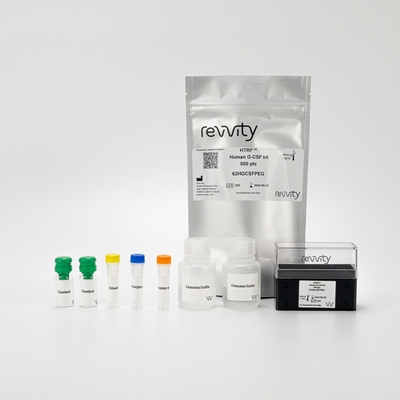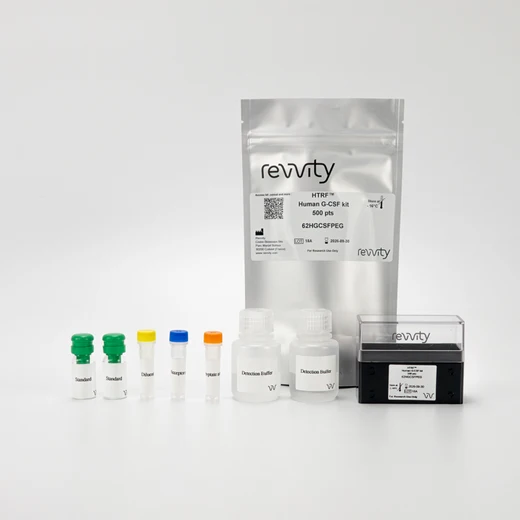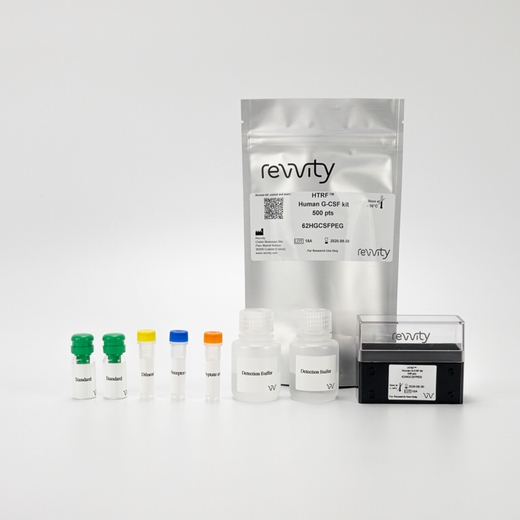

HTRF Human G-CSF Detection Kit, 500 Assay Points


HTRF Human G-CSF Detection Kit, 500 Assay Points






The HTRF human G-CSF kit is designed for the quantification of human G-CSF release in cell supernatant.
For research use only. Not for use in diagnostic procedures. All products to be used in accordance with applicable laws and regulations including without limitation, consumption and disposal requirements under European REACH regulations (EC 1907/2006).
| Feature | Specification |
|---|---|
| Application | Protein Quantification |
| Sample Volume | 16 µL |
The HTRF human G-CSF kit is designed for the quantification of human G-CSF release in cell supernatant.
For research use only. Not for use in diagnostic procedures. All products to be used in accordance with applicable laws and regulations including without limitation, consumption and disposal requirements under European REACH regulations (EC 1907/2006).



HTRF Human G-CSF Detection Kit, 500 Assay Points



HTRF Human G-CSF Detection Kit, 500 Assay Points



Product information
Overview
Also known as CSF3 (colony-stimulating factor 3), G-CSF is a hematopoietic cytokine. It acts on precursor cells in bone marrow to initiate ir proliferation and differentiation into mature granulocytes, on hematopoietic stem cells to induce ir mobilization in blood stream, and on neurons to promote neurogenesis and block apoptosis. In myocardial infarction or ischemia, G-CSF promotes T cells' immune tolerance and tissue recovery. absence of a functional G-CSF receptor is associated with congenital neutropenia.
Assessment of serum samples often requires enhanced sensitivity. In some cases, AlphaLISA assays may have sufficient sensitivity to enable detection of low levels of analytes in serum or plasma.
Specifications
| Application |
Protein Quantification
|
|---|---|
| Brand |
HTRF
|
| Detection Modality |
HTRF
|
| Product Group |
Kit
|
| Sample Volume |
16 µL
|
| Shipping Conditions |
Shipped in Dry Ice
|
| Target Class |
Cytokines
|
| Target Species |
Human
|
| Technology |
TR-FRET
|
| Therapeutic Area |
Cardiovascular
Neuroscience
Oncology & Inflammation
|
| Unit Size |
500 Assay Points
|
Video gallery

HTRF Human G-CSF Detection Kit, 500 Assay Points

HTRF Human G-CSF Detection Kit, 500 Assay Points

How it works
Assay principle
Cell supernatant, sample, or standard is dispensed directly into the assay plate for the detection by HTRF® reagents (384-well low-volume white plate or Cisbio low-volume 96-well plate in 20 µl). The antibodies labeled with the HTRF donor and acceptor are pre-mixed and added in a single dispensing step, to further streamline the assay procedure. The assay can be run up to a 1536-well format by simply resizing each addition volume proportionally.

Assay data analysis
The 4 Parameter Logistic (4PL) curve is commonly recommended for fitting an ELISA standard curve. This regression enables the accurate measurement of an unknown sample across a wider range of concentrations than linear analysis, making it ideally suited to the analysis of biological systems like cytokine releases. To fully understand how to deal with HTRF data processing and also 4PL 1/y² fitting. Revvity also worked with Myassays.com to help you in your data analysis.
Assay details
Technical specifications of human G-CSF kit
| Sample size | 16 µL |
|---|---|
| Final assay volume | 20 µL |
| Kit components | Lyophilized standard, frozen detection antibodies, buffers &protocol. |
| LOD &LOQ (in Diluent) | 27 pg/mL &47 pg/mL |
| Range | 47 4,500 pg/mL |
| Time to result | Overnight at RT |
| Calibration | NIBSC (09/136) value (IU/mL) = 0,07 x HTRF hGCSF HTRF |
| Species | Human only |
Analytical performance
Intra and inter assay
Intra-assay (n=24)
| Sample | Mean [G-CSF] (pg/mL) | CV |
|---|---|---|
| 1 | 47 | 18% |
| 2 | 2036 | 7% |
| 3 | 3780 | 6% |
| Mean CV | 10% |
Each of the 3 samples was measured 24 times, and % CV was calculated for each sample.
Inter-assay (n=4)
| Sample | [G-CSF] (pg/mL) | Mean (delta R) | CV |
|---|---|---|---|
| 1 | 87 | 222 | 13% |
| 2 | 423 | 883 | 8% |
| 3 | 2045 | 3161 | 6% |
| Mean CV | 9% |
Each of the samples was measured in 4 different experiments, and % CV was calculated for each sample.
Resources
Are you looking for resources, click on the resource type to explore further.
The definitive guide to setting up a successful cytokine assay
Many therapeutic areas require an understanding of cytokine release...
Discover the versatility and precision of Homogeneous Time-Resolved Fluorescence (HTRF) technology. Our HTRF portfolio offers a...
This guide provides you an overview of HTRF applications in several therapeutic areas.
Cytokines play a vital role in both innate and adaptive immunity and are known for their ability to exert diverse functions on...
Advance your autoimmune disease research and benefit from Revvity broad offering of reagent technologies


How can we help you?
We are here to answer your questions.






























